高中常见的情景交际用语
- 格式:doc
- 大小:47.00 KB
- 文档页数:3
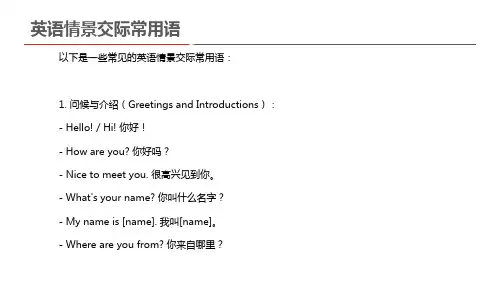
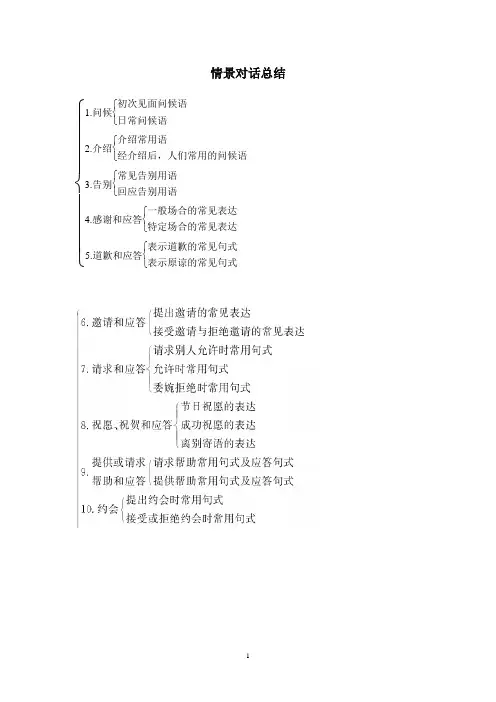
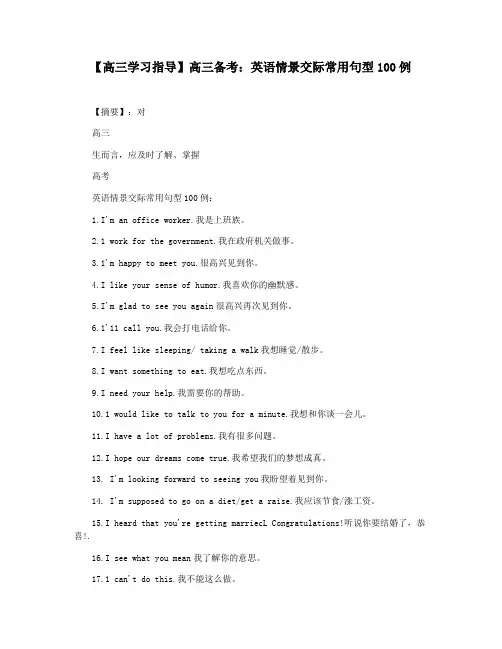
【高三学习指导】高三备考:英语情景交际常用句型100例【摘要】:对高三生而言,应及时了解、掌握高考英语情景交际常用句型100例:1.I'm an office worker.我是上班族。
2.1 work for the government.我在政府机关做事。
3.1'm happy to meet you.很高兴见到你。
4.I like your sense of humor.我喜欢你的幽默感。
5.I'm glad to see you again很高兴再次见到你。
6.1'11 call you.我会打电话给你。
7.I feel like sleeping/ taking a walk我想睡觉/散步。
8.I want something to eat.我想吃点东西。
9.I need your help.我需要你的帮助。
10.1 would like to talk to you for a minute.我想和你谈一会儿。
11.I have a lot of problems.我有很多问题。
12.I hope our dreams come true.我希望我们的梦想成真。
13. I'm looking forward to seeing you我盼望着见到你。
14. I'm supposed to go on a diet/get a raise.我应该节食/涨工资。
15.I heard that you're getting marriecL Congratulations!听说你要结婚了,恭喜!.16.I see what you mean我了解你的意思。
17.1 can't do this.我不能这么做。
18. Let me explain why l was late.让我解释迟到的理由。
19. I.et,s have a beer or something.咱们喝点啤酒什么的。
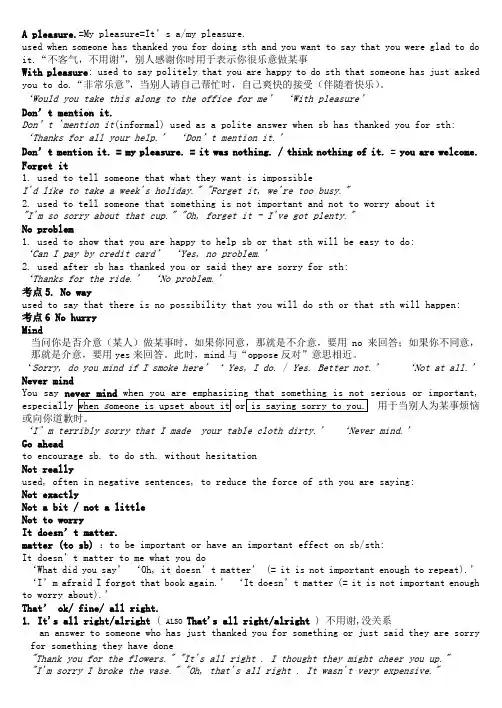
A pleasure.=My pleasure=It’s a/my pleasure.used when someone has thanked you for doing sth and you want to say that you were glad to do it.“不客气,不用谢”,别人感谢你时用于表示你很乐意做某事With pleasure: used to say politely that you are happy to do sth that someone has just asked you to do.“非常乐意”,当别人请自己帮忙时,自己爽快的接受(伴随着快乐)。
‘W ould you take this along to the office for me’ ‘With pleasure’Don’t mention it.Don’t 'mention it(informal) used as a polite answer when sb has thanked you for sth:‘Thanks for all your help.’ ‘Don’t mention it.’Don’t mention it. = my pleasure. = it was nothing. / think nothing of it. = you are welcome. Forget it1. used to tell someone that what they want is impossibleI'd like to take a week's holiday." "Forget it, we're too busy."2. used to tell someone that something is not important and not to worry about it"I'm so sorry about that cup." "Oh, forget it - I've got plenty."No problem1. used to show that you are happy to help sb or that sth will be easy to do:‘Can I pay by credit card’ ‘Yes, no problem.’2. used after sb has thanked you or said they are sorry for sth:‘Thanks for the ride.’ ‘No problem.’考点5. No wayused to say that there is no possibility that you will do sth or that sth will happen:考点6 No hurryMind当问你是否介意(某人)做某事时,如果你同意,那就是不介意,要用no 来回答;如果你不同意,那就是介意,要用yes来回答。
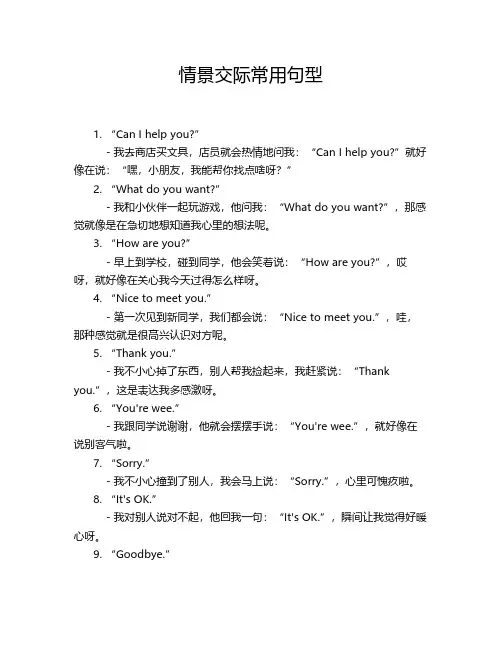
情景交际常用句型
1.“Can I help you?”
-我去商店买文具,店员就会热情地问我:“Can I help you?”就好像在说:“嘿,小朋友,我能帮你找点啥呀?”
2.“What do you want?”
-我和小伙伴一起玩游戏,他问我:“What do you want?”,那感觉就像是在急切地想知道我心里的想法呢。
3.“How are you?”
-早上到学校,碰到同学,他会笑着说:“How are you?”,哎呀,就好像在关心我今天过得怎么样呀。
4.“Nice to meet you.”
-第一次见到新同学,我们都会说:“Nice to meet you.”,哇,那种感觉就是很高兴认识对方呢。
5.“Thank you.”
-我不小心掉了东西,别人帮我捡起来,我赶紧说:“Thank you.”,这是表达我多感激呀。
6.“You're wee.”
-我跟同学说谢谢,他就会摆摆手说:“You're wee.”,就好像在说别客气啦。
7.“Sorry.”
-我不小心撞到了别人,我会马上说:“Sorry.”,心里可愧疚啦。
8.“It's OK.”
-我对别人说对不起,他回我一句:“It's OK.”,瞬间让我觉得好暖心呀。
9.“Goodbye.”
-放学了,和同学们分别时,我们都会说:“Goodbye.”,就像是在说下次再见啦。
10.“See you later.”
-去朋友家玩完要回家了,我会说:“See you later.”,感觉就是期待着下一次见面呢。

盘点情景交际用语————————————————————————————————作者: ————————————————————————————————日期:ﻩ盘点情景交际用语高考中的情景交际题是在特定的语言环境中考查考生运用语言的能力,但由于受到中西方文化不同思维方式的影响,或只单纯地考虑语法规则而忽视礼貌得体原则,结果往往选错答案。
结合较历年高考试题,将常见的情景交际用语归纳如下:一、“没关系;不要紧;没问题;别提了…”类⒈Never mind意为“没关系;不要紧;不用费事”,常用于以下几种场合:1)当别人向你致歉时;2)请对方放心或安慰对方时注意:由于受字面意思的影响,很多学生把Never mind用于对Do\Would you mind…的否定回答。
对Do\Would you mind…表示“不介意”时常用No,notat all;ofcourse not;certainly not;No, please;No,go ahead等;表示“介意”的回答为Youhad better not;You’drather not;I’mafraid…not;I’m sorry,but…等。
⒉Forget it 意为“没关系;不要紧;别提了”,通常用于以下场合:1)当别人向你致歉时;2)不同意对方要求的委婉拒绝⒊No problem意为“没问题;成”。
通常用于对别人的请求表示同意。
类似的表达还有:All right;OK。
⒋Itdoesn’t matter相当于No matter,意为“没关系;不要紧”,通常用于对别人道歉的答语。
高考链接:①-----Wouldyou mindmy coming and having a look at yournewgarden?Mylittleson’scuriousabout roses you grow。
-----_______。
You’re welcome。
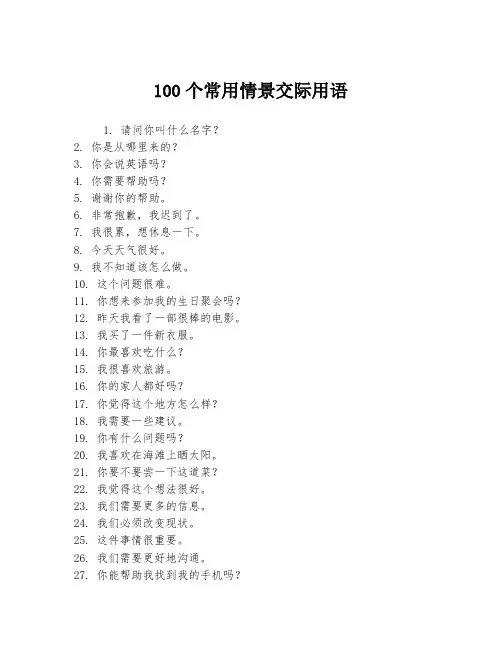
100个常用情景交际用语1. 请问你叫什么名字?2. 你是从哪里来的?3. 你会说英语吗?4. 你需要帮助吗?5. 谢谢你的帮助。
6. 非常抱歉,我迟到了。
7. 我很累,想休息一下。
8. 今天天气很好。
9. 我不知道该怎么做。
10. 这个问题很难。
11. 你想来参加我的生日聚会吗?12. 昨天我看了一部很棒的电影。
13. 我买了一件新衣服。
14. 你最喜欢吃什么?15. 我很喜欢旅游。
16. 你的家人都好吗?17. 你觉得这个地方怎么样?18. 我需要一些建议。
19. 你有什么问题吗?20. 我喜欢在海滩上晒太阳。
21. 你要不要尝一下这道菜?22. 我觉得这个想法很好。
23. 我们需要更多的信息。
24. 我们必须改变现状。
25. 这件事情很重要。
26. 我们需要更好地沟通。
27. 你能帮助我找到我的手机吗?28. 我敬佩你的勇气。
29. 我很高兴见到你。
30. 我们一起去散步吧。
31. 你可以给我一杯水吗?32. 这个地方非常美丽。
33. 明天我们一起去购物吧。
34. 这个建议是非常好的。
35. 我感到非常兴奋。
36. 我已经打算好了。
37. 我有点担心。
38. 我们应该尽快采取行动。
39. 你的建议很有价值。
40. 我们需要更多的资源。
41. 我可以为你做些什么?42. 我不知道该说什么才好。
43. 我希望你能理解我的想法。
44. 你需要一些帮助吗?45. 我们必须考虑未来。
46. 这是我的邮箱地址。
47. 我们需要一起工作。
48. 我尽力而为。
49. 我们需要更好的计划。
50. 这是一个很难的决定。
51. 我喜欢跑步。
52. 我们应该保持联系。
53. 我们需要相互支持。
54. 我听到的消息很令人震惊。
55. 我将尽快完成任务。
56. 我们应该遵守规定。
57. 我们需要更好的沟通。
58. 这是一个很重要的问题。
59. 我有一个聚会,并邀请你参加。
60. 我喜欢音乐。
61. 我很感激你的帮助。
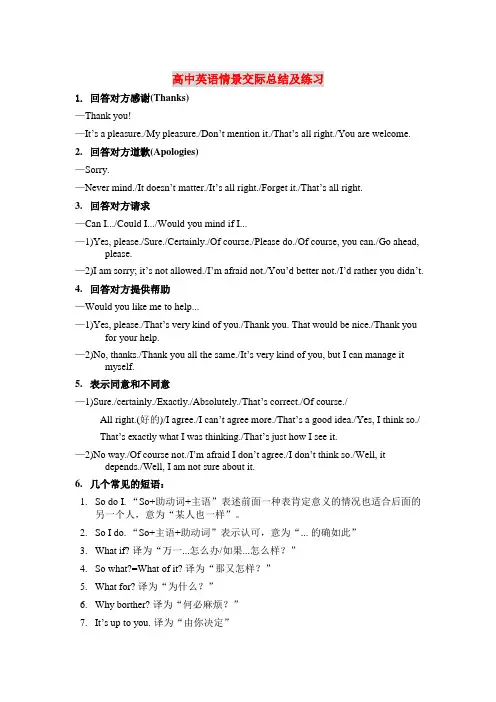
高中英语情景交际总结及练习1.回答对方感谢(Thanks)—Thank you!—It’s a pleasure./My pleasure./Don’t mention it./That’s all right./You are welcome. 2.回答对方道歉(Apologies)—Sorry.—Never mind./It doesn’t matter./It’s all right./Forget it./That’s all right.3.回答对方请求—Can I.../Could I.../Would you mind if I...—1)Yes, please./Sure./Certainly./Of course./Please do./Of course, you can./Go ahead, please.—2)I am sorry; it’s not allowed./I’m afraid not./You’d better not./I’d rather you didn’t.4.回答对方提供帮助—Would you like me to help...—1)Yes, please./That’s very kind of you./Thank you. That would be nice./Thank you for your help.—2)No, thanks./Thank you all the same./It’s very kind of you, but I can manage it myself.5.表示同意和不同意—1)Sure./certainly./Exactly./Absolutely./That’s correct./Of course./All right.(好的)/I agree./I can’t agree more./That’s a good idea./Yes, I think so./ That’s exactly what I was thinking./That’s just how I see it.—2)No way./Of course not./I’m afraid I don’t agree./I don’t think so./Well, it depends./Well, I am not sure about it.6.几个常见的短语:1.So do I. “So+助动词+主语”表述前面一种表肯定意义的情况也适合后面的另一个人,意为“某人也一样”。
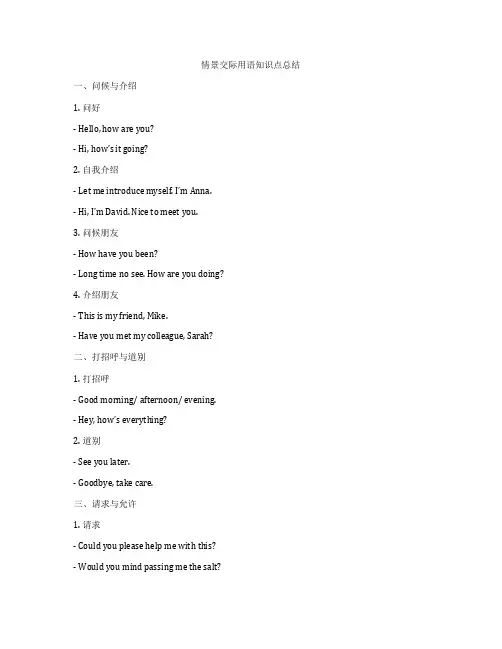
情景交际用语知识点总结一、问候与介绍1. 问好- Hello, how are you?- Hi, how’s it going?2. 自我介绍- Let me introduce myself. I’m Anna.- Hi, I’m David. Nice to meet you.3. 问候朋友- How have you been?- Long time no see. How are you doing?4. 介绍朋友- This is my friend, Mike.- Have you met my colleague, Sarah?二、打招呼与道别1. 打招呼- Good morning/ afternoon/ evening.- Hey, how’s everything?2. 道别- See you later.- Goodbye, take care.三、请求与允许1. 请求- Could you please help me with this?- Would you mind passing me the salt?2. 允许- Sure, no problem.- Of course, go ahead.四、感谢与回应1. 表示感谢- Thank you so much for your help. - I really appreciate it.2. 回应- You’re welcome.- No problem, glad to help.五、表达喜欢与不喜欢1. 喜欢- I really like this restaurant.- I’m a big fan of jazz music.2. 不喜欢- I don’t care for spicy food.- I’m not too keen on horror movies.六、表达赞同与不赞同1. 赞同- I totally agree with you.- That’s a great idea.2. 不赞同- I’m not sure I agree with that.- I’m afraid I have to disagree.七、请求和提供帮助1. 请求帮助- Could you please help me carry this?- Can you give me a hand with this?2. 提供帮助- Let me help you with that.- Do you need any assistance?八、询问与解释1. 询问- Could you tell me how to get to the nearest bank? - Do you know where the restroom is?2. 解释- That’s a long story, let me explain.- Let me clarify what I meant.九、道歉与原谅1. 道歉- I’m really sorry for being late.- Please forgive me for my mistake.2. 原谅- It’s okay, don’t worry about it.- I forgive you, no hard feelings.十、讨论和商议1. 讨论- Let’s discuss the details of the projec t.- I’d like to talk about our plans for next week.2. 商议- Let’s negotiate a better deal.- Can we come to an agreement on this issue?十一、祝福与祝愿1. 祝福- Best wishes on your birthday.- Good luck with your new job.2. 祝愿- I hope you have a great time at the party.- I wish you all the best in your future endeavors.。
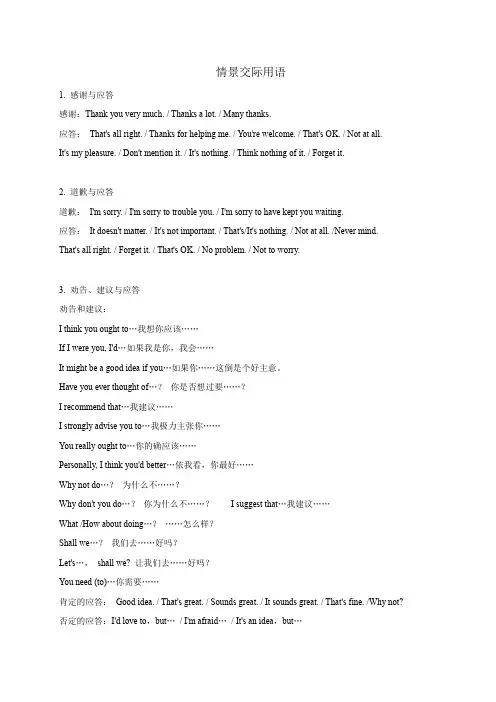
情景交际用语1. 感谢与应答感谢:Thank you very much. / Thanks a lot. / Many thanks.应答:That's all right. / Thanks for helping me. / You're welcome. / That's OK. / Not at all.It's my pleasure. / Don't mention it. / It's nothing. / Think nothing of it. / Forget it.2. 道歉与应答道歉:I'm sorry. / I'm sorry to trouble you. / I'm sorry to have kept you waiting.应答:It doesn't matter. / It's not important. / That's/It's nothing. / Not at all. /Never mind.That's all right. / Forget it. / That's OK. / No problem. / Not to worry.3. 劝告、建议与应答劝告和建议:I think you ought to…我想你应该……If I were you, I'd…如果我是你,我会……It might be a good idea if you…如果你……这倒是个好主意。
Have you ever thought of…?你是否想过要……?I recommend that…我建议……I strongly advise you to…我极力主张你……You really ought to…你的确应该……Personally, I think you'd better…依我看,你最好……Why not do…?为什么不……?Why don't you do…?你为什么不……?I suggest that…我建议……What /How about doing…?……怎么样?Shall we…?我们去……好吗?Let's…,shall we? 让我们去……好吗?You need (to)…你需要……肯定的应答:Good idea. / That's great. / Sounds great. / It sounds great. / That's fine. /Why not? 否定的应答:I'd love to,but…/ I'm afraid…/ It's an idea,but…4. 请求与应答请求:May I…?/ Can I? / Could I…?/ Do you mind if I…肯定的应答:With pleasure. / Certainly(Of course) / Sure,go ahead. / Yes,help yourself.Of course not,go ahead(回答Do you mind if I…的请求).否定的应答:I'm afraid not. / Better not. / I'd rather you didn't.5. 应答对方的要求肯定的:All right. / I will.否定的:No way. / Forget it.—Do remember to call me up when you arrive. —I will.—I think you should phone Jenny and say sorry to her.—No way. It was her fault.6. 邀请与应答邀请:Would you like to…?/ Why don't we…?肯定的应答:That would be fine. / That's very kind of you. /All right. /Yes,I'd love to.否定的应答:I'd love to,but…/ Sorry,I can't. / I'm afraid I can't.7. 祝愿、祝贺与应答祝愿、祝贺:Good luck! / Best wishes to you. /Have a nice/good time/journey. /Congratulations! Happy New Year! / Merry Christmas! / Happy birthday to you.应答:Thank you! / The same to you. / You,too. / Happy New Year!(Merry Christmas!)8. 鼓励、赞扬与应答鼓励、赞扬:Very good. / Well done. /Wonderful. /Excellent. /Keep trying. /You can do it.应答:Thank you. / OK. /I'll try it again.9. 提供帮助与应答主动提供帮助时:Can I help you? /What can I do for you /Would you like me to help you?Do you want me to… / Let me…需要别人帮助时:Yes,please. / Thank you for your help/ Thanks.不需要别人帮助时:No,thank you./ Thank you all the same. / That's very kind of you, but…二、情感态度的表达1. 表示惊奇:Really? / How come?(何以会……?) / What a surprise! /Good heavens!2. 表示同情:I'm sorry to hear that. / What a pity! / That's really unlucky. / Bad luck.3. 表示安慰:Don't worry. / Don't be afraid. / Take your time. / Take it easy.Make yourself at home. / It's quite all right. / It'll be OK.4. 表示鼓励:Come on. / Cheer up. / You can do it. / You will make it.5. 表示同意:I quite agree. / I couldn' t agree more. / Exactly. /Certainly. /Absolutely.That's a good idea. / No problem. / I think so.6. 表示不同意:Not really. / Not Exactly. / I don't quite agree. /I don't think so. / I'm afraid not.7. 表示不在乎:So what? / Who cares?二.练习巩固1. — ________ were you so late this morning?—I forgot to set the alarm before going to bed last night.A.how about B.Why C.how come D.how2. — Try this yellow shirt. —________.—how about the red one? —That’s OK.A.But I don’t like the size B.I like it very muchC.But I don’t like the color D.I’ll take it3. — I have got a cough and my chest hurts.—________. Let me examine you.A.Don’t mind B.Take it easyC.You should learn to protect yourselfD.Keep calm. You will recover soon4. — ________ It will help you a lot.—That’s a good idea. Let’s make some.A.I promise to get you some coffee. B.Would you please make me some coffee?C.Help yourself to some coffee. D.You’d better have some coffee.()5. — The girl was punished too seriously.—Yes,________.A.but I think not B.and I was afraid not C.and I thought not D.but I had thought not 6.——I’m so tired, working all morning on the farm.——Why not take a rest, then?—______.A. Because I can’tB. Maybe I shouldC. I don’t knowD. Sorry, I can’t tell you.7. — Well,my wife and daughter take great interest in most of the food on the menu.— Thanks.________?—Salad,fried fish,chips and orange juice,please.A.Shall I take your order B.At your service C.Can I help you D.What to follow8. —My daughter has passed the exam.—Congratulations! She’s really intelligent.—________A.No,no,she is nothing. B.Oh,thank you.C.Sometimes she is intelligent. D.You are right.9. —My children are always arguing. —________A.Just ignore them. B.That’s all right.C.Are you sure? D.How old are the boys?10. —Don’t forget to phone me when you get home. Just to let me know you’ve arrived safely.—I won’t forget. Goodbye then.—________.A.With pleasure B.have a nice trip C.Don’t mention it D.It’s very kind of you11. —Don’t forget to post the letter.—________.A.Yes,I will B.No,I won’t C.I don’t think so D.Sorry,I wouldn’t12. —What’s going on? —________A.No,we won’t go on. We need rest.B.The Times Theatre is on fire.C.I’m going on telling the story.D.How about some ice cream?13. — ________ that he came here yesterday? —By taxi.A.How it was B.How was it C.How are you D.How were you14. —I’m sorry to hear that your mother is ill in hospital. —________A.That’s all right. B.Don’t be so sorry. She’s well soon.C.It’s nothing. D.It’s very kind of you.15. —Let me introduce myself to you, I’m Robert. —________.A. With pleasureB. It’s my pleasureC. Pleased to meet youD. I’m very pleased16. —Your name again, please? _________.—It’s Bell GreenA. I didn’t quite catch youB. I couldn’t quite catch youC. I do n’t hear youD. It’s your name17. —I can not thank you enough for the gift you sent me. —________.A.No,thanks B.With pleasure C.My pleasure D.Please don’t say so 18. —What do you think of that tea set as a gift for Mary’s birthday?—________,but I don’t particularly care for the design.A.It’s the right thing B.I think it’s a Chinese styleC.Not bad D.Let me think it over once again19. —Tom,I’ve lost my keys again.—Here,not again! You________ your keys.A.always lost B.always lose C.are always losing D.have always been losing 20. —Bruce was killed in a traffic accident.—________ I talked with him yesterday morning!A.What a pity! B.I beg your pardon?C.Sorry to hear that. D.Is that so?新题预测1.—Long time no see! You look fine.—________. You look well, too.A. ThanksB. GreatC. Oh, noD. Congratulations2.—Sorry, I broke your wineglass. —_____You didn't mean to.A.Never mind. B.Certainly not C.Why not be careful?D.Don't mention it.3.—Let me help you cross the street.—________ ! I'm not that old.A.Take your time B.No way C.Come on D.Go ahead4.—Who are you waiting for? —________ the man wounded in the left leg.A. The doctor will operate onB. The nurse to be looked afterC.The doctor to operate on D. The nurse will look after5.—Do you think it's going to rain over the weekend? —________. We're planning to go on a picnic.A. I think soB. I believe notC. I don't think soD. I hope not6.—Would you min d if I closed the window?—________. It's that cold outside.A. Sorry, I'm afraidB. Yes, help yourselfC. Sorry, you don'tD. No, go ahead7.—Karen, can I talk to you for a minute?—Sure, ________?A. how comeB. what's upC. how's thatD. what for8.—My mother is preparing my favorite dishes. Go with me and have a taste, okay?—________. And I'll be glad to meet your parents.A. I think soB. I'd love toC. I'm sureD. I hope so9.—So you missed the meeting.—________. I got there five minutes before it finished.A.Not at all B.Not exactly C.Not especially D.Not really10.—Jack was admitted to Harvard University.—________?He is only 12 years old.A.So what B.Who cares C.Are you kidding D.What for完型填空训练My Little AngleI had offered to watch my 3-year-old daughter, so that my wife could go out with a friend. I was getting some work done in my study while she 1 to be having a good time in the other room. No problem, I figured. But then it got a little too 2 and I shouted, “What are you doing?” No response. I3 my question and heard her say, “Oh…nothing.” Nothing?I got up from my desk and ran out 4 the living room, where I saw her running across the hall. I followed and watched her as her little behind made a quick 5 into the bathroom. I had her 6 ! I told her to turn around. She 7 . I pulled out my big Daddy voice, “Young lady, I said turn around!”8 , she turned toward me. In her hand was what was left of my wife’s new lipstick. And everysquare inch of her face was 9 with bright red! As she looked up at me with fearful eyes. I heard 10 voice that had been shouted to me as a child. “How could you… You should know…How many times have you been 11 What a bad thing to…” it was just a matter of my picking out which old 12 I was going to use on her so that she would know what a bad girl she had been. But 13 I could let loose, I looked 14 at the sweater on her. In big 15 it said. “I’M A PERFECT LITTLE ANGEL!” I looked back up into her tearful eyes and, 16 seeing bad girl who didn’t listen, I saw a little angel full of17 that I had come dangerously close to 18 . “Sweetheart, let’s take a picture so Mommy can see how 19 you look.” I took the picture and thanked God that I didn’t 20 the chance to prove what a perfect little angel he had given me.1. A. happened B. liked C. appeared D. pretended2. A. long B. quiet C. calm D. strange3. A. asked B. answered C. raised D. repeated4. A. into B. of C. from D. for5. A. way B. turn C. change D. progress6. A. followed B. scolded C. cornered D. fooled7. A. laughed B. listened C. agreed D. refused8. A. Slowly B. Eagerly C. Angrily D. Unfortunately9. A. filled B. marked C. printed D. covered10. A. every B. such C. any D. one11. A. told B. beaten C. frightened D. forbidden12. A. reports B. notice C. advice D. words13. A. as B. when C. since D. before14. A. up B. down C. in D. on15. A. signs B. letters C. messages D. figures16. A. because of B. instead of C. in spite of D. as a result of17. A. value B. sadness C. pities D. tricks18. A. preventing B. getting rid of C. destroying D. doing wrong on19. A. dirty B. ugly C. special D. silly20. A. have B. get C. take D. miss(二)He has been called the “missing l ink”. Half-man, half beast. He is supposed to live in the highest mountain in the world—Mount Everest.He is known as the Abominable Snowman. The 1 of the Snowman has been around for 2 . Climbers in the 1920s reported finding marks like those of human feet high up on the side of Mount Everest. The native people said they 3 this creature and called it the “Yeti,” and they said that they had 4 caught Yetis on two occasions 5 none has ever been produced as evidence.Over the years, the story of the Yetis has 6 . In 1951, Eric Shipton took photographs of a set of tracks in the snow of Everest. Shipton believed that they were not 7 the tracks of a monkey or bear and 8 that the Abominable Snow man might really 9 .Further efforts have been made to find out about Yetis. But the only things people have ever found were 10 footprints. Most believe the footprints are nothing more than 11 animal tracks, which had been made 12 as they melted and refroze in the snow. 13 , in 1964, a Russian scientist said that the Abominable Snowman was 14 and was a remaining link with the prehistoric humans. But, 15 , no evidence has ever 16 been produced.These days, only a few people continue to take the story of the Abominable Snowman 17 . But if they ever 18 catching one, they may face a real 19 : Would they put it in a 20 or give it a room in a hotel?1. A. event B. story C. adventure D. description2. A. centuries B. too long C. some time D. many years3. A. heard from B. cared for C. knew of D. read about4. A. even B. hardly C. certainly D. probably5. A. as B. though C. when D. until6. A. developed B. changed C. occurred D. continued7. A. entirely B. naturally C. clearly D. simply8. A. found B. declared C. felt D. doubted9. A. exist B. escape C. disappear D. return10. A. clearer B. more C. possible D. rare11. A. huge B. recent C. ordinary D. frightening12. A. strange B. large C. deep D. rough13. A. In the end B. Therefore C. After all D. However14. A. imagined B. real C. special D. familiar15. A. so B. besides C. again D. instead16. A. rightly B. actually C. Normally D. particularly17. A. lightly B. jokingly C. seriously D. properly18. A. succeed in B. insist on C. depend on D. join in19. A. decision B. situation C. subject D. problem20. A. zoo B. mountain C. museum D. laboratory。
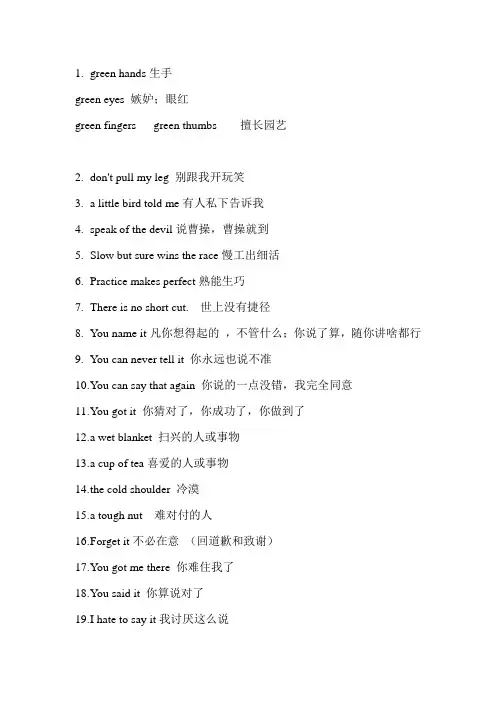
1.green hands生手green eyes 嫉妒;眼红green fingers green thumbs 擅长园艺2.don't pull my leg 别跟我开玩笑3.a little bird told me有人私下告诉我4.speak of the devil说曹操,曹操就到5.Slow but sure wins the race慢工出细活6.Practice makes perfect熟能生巧7.There is no short cut. 世上没有捷径8.You name it凡你想得起的,不管什么;你说了算,随你讲啥都行9.You can never tell it 你永远也说不准10.Y ou can say that again 你说的一点没错,我完全同意11.Y ou got it 你猜对了,你成功了,你做到了12.a wet blanket 扫兴的人或事物13.a cup of tea喜爱的人或事物14.t he cold shoulder 冷漠15.a tough nut 难对付的人16.F orget it不必在意(回道歉和致谢)17.Y ou got me there 你难住我了18.Y ou said it 你算说对了19.I hate to say it我讨厌这么说20.N ot exactly 不全是;不见得21.I've got that 我明白了22.T hat's settled 一言为定23.one's meat is another man's poison 萝卜青菜各有所爱24.我认为他不会。
肯定回答I believe so , 否定回答I believe not25.A ll the best祝酒或送行时用语,“万事吉利,一路平安”26.I t is nothing 不用谢27.N o thanks 为中国式英语28.Let 's grab a bite to eat. 让我们赶紧吃点东西吧29.A ll right 好的;可以;情况良好That's all right没关系;不客气(回答道歉和致谢)That's right 对,没错30.Thank goodness 谢天谢地;幸亏31.Let's get going 让我们开始吧32.play the game 按章办事,守规矩33.cross your fingers 祈求好运34.raise the red flag 警告35.kill the fatted calf 设宴欢迎36.You bet当然;真的I bet我敢肯定37.You're kidding 你在开玩笑38.Why bother 为什么费事?39.I mean it 我是认真的40.take your time 别着急,慢慢来41.It's not a big deal 没什么大不了的42.How do you find sth 你认为~~~怎么样?43.Y ou can't be serious. 别开玩笑了44.You got it. 你明白的;你说对了;你成功了;你做到了45.I'm stuck. 我被困住了46.That's something. 真是太棒了47.Let’s call it a day我们今天就到这儿吧48.That's the case 情况是这样49.not a bit=not at all 一点也不;not a little=quite=very much非常not in the least=not the least,/not in the least bit 一点也不50.How come 为什么,怎么会这样51.a black sheep 害群之马,败家子52.an odd fish 古怪的人53.Well, that's the last thing I will do那是我最不愿意做的事54.That's the point这是关键所在55.That's settled解决了56.Be all ears 全神贯注地听着,专心倾听57.a Herculean task 极为艰巨的工作58.a sacred cow 不能批评的人或事;不可侵犯的人或组织机构等59.a Mickey Mouse course 易如反掌的事60.sink or swim孤注一掷61.push your luck得寸进尺62.shop around货比三家63.You are asking for it 你自讨苦吃64.Don't get me wrong 不要误会我65.Don't count your chickens until they are hatched 别高兴太早了66.a David and Goliath battle 强弱悬殊;以弱战强67.a Jekyll and Hyde existence有两种面目的人,具双重人格的人68.a slip of the tongue 口误69.a child's play 轻而易举;微不足道,毫无意义的事70.By all means 无论如何;尽一切办法;一定;务必;当然可以71.It just depends 看情况而定st straw 压死骆驼的最后一根稻草73.Don’t you dare你敢74.Just sort of 有点75.Leave me alone. 别管我;别理我76.Don’t mention it. 不用谢;不客气;没关系(回道歉和致谢)Don't mention it 不用于回答道歉77.How come 怎么回事?怎么搞得?为什么78.You deserve it 这是你应得的79.Hardly surprising! 一点也不令人吃惊80.It was nothing. 别担心;没什么要紧的81.That’s O K不用了;没关系;可以;没什么;不客气(回致谢道歉)82.That’s all right!没关系,不客气(回答道歉或感谢)83.Feel free请便, 随意84.Not a chance不可能85.Not to mention it别客气86.What a relief ! 可以松口气了87.cheer up 振奋起来;高兴起来88.good heavens (表示惊奇或气恼)天啊,我的天。
情景交际常用句型1.问候和介绍(1) 问候a A:Hello./Hi./How do you do? 你好。
B: Hello./Hi./How do you do? 你好。
b.A:Hello.How are you?你好,你好吗?B:Fine,thank you.And you? 很好,谢谢你。
那你呢?A:Very well,thank you. 也很好,谢谢。
c.A:Good morning/afternoon/evening.早上/下午/晚上好。
B:Good morning/afternoon/evening.早上/下午/晚上好。
d.A:Nice/Glad/Pleased to see you! 很高兴见到你!B:Nice/Glad/Pleased to see you,too! 我也很高兴见到你!e.A:How is it going? 最近怎样?B:Pretty good/Great/Not bad/Terrible! 相当好/很好/不错/不好!(2)介绍a.My name is Susan./I'm Gina. 我的名字是苏珊。
/我是吉娜。
b.I'm from China./I come from China.我来自中国。
c.This is Mr Green. 这是格林先生。
2.感谢及答语(1)感谢a.Thank you./Thanks a lot./Thank you very much.谢谢你/非常感谢/非常感谢你b.Thank you for your help. 感谢你的帮助c.Thank you all the same. 尽管如此,还是要谢谢你。
(2)答语a.It is a plessure./My pleasure./With pleasure. 这是我的荣幸。
b.You are welcome./Not at all./Don't mention it. 别客气。
盘点情景交际用语高考中得情景交际题就是在特定得语言环境中考查考生运用语言得能力,但由于受到中西方文化不同思维方式得影响,或只单纯地考虑语法规则而忽视礼貌得体原则,结果往往选错答案。
结合较历年高考试题,将常见得情景交际用语归纳如下:一、“没关系;不要紧;没问题;别提了…”类⒈Never mind意为“没关系;不要紧;不用费事”,常用于以下几种场合:1)当别人向您致歉时;2)请对方放心或安慰对方时注意:由于受字面意思得影响,很多学生把Never mind用于对Do\Would you mi nd…得否定回答。
对Do\Would you mind…表示“不介意”时常用No, not at all;of course not;certainly not;No, please;No,go ahead等;表示“介意”得回答为You had better not;You’d rather not;I’m afraid…not;I’m sorry,but…等。
⒉Forget it 意为“没关系;不要紧;别提了”,通常用于以下场合:1)当别人向您致歉时;2)不同意对方要求得委婉拒绝⒊No problem意为“没问题;成”。
通常用于对别人得请求表示同意。
类似得表达还有:All right;OK。
⒋It doesn’t matter相当于No matter,意为“没关系;不要紧”,通常用于对别人道歉得答语。
高考链接:①Would you mind my ing and having a look at your new garden?My little son’s curious about roses you grow。
_______。
You’re wele。
A.Yes, I do B、Never mindC、Yes, pleaseD、Not at all②I don’t have any change with me。
情景交际It depends!(视情况而定);what if(倘若......会怎么样);What for?(做什么用,为什么);So what ?(那又怎么样);Like what 比如什么Got it!(明白了);Take your time.(别着急);Take it easy.(放松点);It’s up to…(由……决定)。
Not at all. 一点也不···My pleasure. 这是我的荣幸(不客气)With pleasure 乐意效劳(帮助别人时)Don’t mention it. 别提了、不客气Forget it.别提了、不客气It doesn't matter. 没关系Never mind. 没关系、不介意Sounds great.听起来很棒Why not? 为什么不呢Why bother? 何苦呢? 何必呢? 为何那么麻烦呢?I’m afraid not 恐怕不行、恐怖不是Do you mind if I…如果···你介意吗Of Course not,当然不···go ahead 去做吧Better not. 最好不要No way. Forget it.没门、想都别想That would be fine. 好的、就这样做吧Well done. 做的好Come on. 得了吧(少来了)、加油How come?(怎么会……?为什么)What a pity!太遗憾啦Cheer up. 加油、打起精神I couldn’t agree more. 我非常同意Absolutely. 当然No problem. 好的,没问题You can't be serious你不是开玩笑吧My treat 我请客Got it(Get it)明白了You've got me你难住我了Guess what?你猜怎么着Not really. 不是这样No doubt 毫无疑问No wonder 难怪呢Hold on 稍等一会How is it going?最近怎么样?Pardon?你说什么?I am with you 我同意你That's a good point 你说的有道理。
高考情景对话题型必备100句第一篇:高考情景对话题型必备100句高考情景对话题型必备100句1.Go ahead 做吧,可以,用吧,拿去,说啊,继续(表赞成或借东西)2.Relax 放松点,振镇静点,别生气(表安慰)3.Take it easy;Take things easy;easy 放轻松,别生气(表安慰)4.No way 不可能(表惊讶)5.No wonder 难怪这样,难怪如此(表理解,醒悟)6.No problem 没问题(表对请求的肯定回答)7.(That’s)all right;没关系(回答道歉)【alright可以】8.(That’s)OK没关系(回答道歉)9.It’s my pleasure;My pleasure 不用谢,别客气(回答感谢)【pleasure愉快的事】10.With pleasure;It’ll be a pleasure 愿意效劳(回答请求)11.That’right;Right;Correct 没错,正确(表肯定对方陈述)12.You can’t be serious 不可能,开玩笑(表惊讶)13.Not really=Not very much 不太…(表部分否定)14.Never mind 没关系,没事(表安慰,回答道歉)15.I don’t mind 我不介意(表提示对方决定)16.Don’t mention it;Not at all;You are welcome;It doesn’t meter 不用谢,别客气(表回答感谢)17.I’m afraid not 恐怕不行(表委婉拒绝)18.So long 再见(表道别)19.See you 再见(表道别)20.Take care 保重(表道别)21.Go Dutch;Go AA AA制 22.Go share平均付费23.Let me(us)get it(this)straight 直说了吧(表理解,坦白)【straight笔直的】24.No,thanks 不用了,谢谢(表委婉拒绝)25.Thanks a lot 谢谢(表感谢)26.I’m sorry to hear that 真遗憾(表同情,惋惜)27.I’m sorry for your loss 节哀顺变(表礼貌性安慰)【loss损失】28.Forget it 没关系(回答道歉),不可能(否定),算了吧(不重复刚才的话)别说了29.That’s very kind(nice)of you 你人真好(对方主动帮忙)30.It(That’s)depends 时情况而定(前提是赞成)31.Sounds great(good)听起来不错32.Good luck 祝你好运33.Cheers 干杯/谢谢34.Cheer up 振作起来(表鼓励)35.What a pity(shame)真可惜【Shame on you真卑鄙】36.Nice having you here 你能来真好(分离时说)37.Just my luck 真倒霉38.Well done 做得好(表赞许)39.Never do it again 下不为例(表原谅0 40.It’s up to youi 由你决定 41.Fair enough=Fine=OK 好的 e on 快点(催促),加油(鼓励),来啊(挑衅)43.Congratulations 祝贺你44.Absolutely;Definitely;Certainly;Exactly;Sure;Of course 是的45.Probably 大概(表委婉肯定)46.That’s a deal;It’s a deal;Deal 一言为定(表回答提议)47.Good idea 好主意(表赞扬)48.Why not? 为什么不呢?49.So what?=I don’t care 那又怎样? 50.How come? 怎么会呢? 51.Whate else? 还有什么?52.What’s up? What’s going on? 怎么了? 53.Guess what、你猜怎么着?54.What’s wrong with you?What’s the matter with you? 你怎么了(询问)/你有毛病啊(愤怒)55.(It’s)none of your business 不管你的事56.I think(belive,suppose,hope,guess)so 我也也这么想(表肯定对方)57.What if? 要是…怎么办?(表假设)58.Have no idea;I don’t know 不知道59.Don’t worry 别担心(表安慰)60.A piece of cake 小事一桩(表肯定)61.Have a good(great)journey 旅途愉快(表祝福)62.Have a nice day;Have a good(great)time 祝你好心情(表祝福)63.Have a try 试一下(表鼓励0 64.No,please don’t 千万别(表反对)65.What a day 真是…的一天啊(表感叹)66.Bingo;You said it;You guessed it 你说对了(表肯定对方)67.Nice try 正确,不错(表肯定对方)68.You’ll make it 你会成功的(表鼓励)69.Yu’d better not 最好别那么做(表委婉劝告)70.Thank goodness 谢天谢地(表感叹)71.For god’s(goodness’)sake;看在上帝/老天份上…(表生气,厌烦,惊讶)72.You really have me there 你把我难倒了(表坦白,不知道)73.Not a chance;No chance;Fat chance 别想了(表拒绝)74.Hard to say 很难说(表不确定)75.It’s a loing story 说来话长(表无奈)76.(I)couldn’t agree more 绝对赞成【否定词+比较级=最高级】77.(It,That)couldn’t be better 真是太好了78.(It,That)couldn’t be worse 真是太糟糕了79.I’d love to,but… 我很愿意,但是(表委婉拒绝0 80.I don’t care 我不在乎81.(Have)patience 耐心点(表劝说)【patience耐心】82.Watch out;Look out;;Be careful当心 83.Yes,sir?什么吩咐/ 84.You got it明白85.I’m on it马上去做86.Are you crazy(nuts)?你疯了吗(表惊讶)87.Copy(Roger)that;Positive;Affirmative;Iknow(see,understand)收到,明白 88.Hurry(up)快点(表催促)89I didn’t mean to.我不是故意的(表惋惜)90.I’d rather you don’t 你不这样做该多好(表惋惜)91.(May I have your)attention,please? 大家请注意(表提示)92.Mind your own business 管好你自己(表劝说)93.Let’s call ita day 今天到此为止94.I know the feeling;I was once there;I can imagine;I feel so 我有同感(表同感)95.How do you find……?=What do you think of……?你认为……怎么样96.How about……?……怎么样(表提议)97.Not exactly 不完全对(表部分否定或委婉否定)98Don’t try my patience 老实点(表愤怒时警告)99.Help yourself(at home)请自便(表招待客人)100.Take your time 慢慢来,不着急(表安慰)注:蓝色短语需重点掌握第二篇:情景对话情景对话范文一、看医生病人:早上好,大夫Patient: Good morning, doctor.医生:早上好,哪里不舒服?Doctor: good morning.What is the matter? /What is wrong with you? 病人:我感冒了。
高中口语表达技巧与常用交际用语梳理口语表达是我们日常交流中非常重要的一部分,它能够让我们与他人更加流利地交流和沟通。
在高中阶段,口语能力的提升对于学生来说尤为关键。
本文将为大家总结一些高中口语表达技巧和常用交际用语,帮助大家更好地提高口语水平。
一、交际用语1. 打招呼- Good morning/afternoon/evening. (早上/下午/晚上好。
)- How are you? (你好吗?)- Nice to meet you. (很高兴见到你。
)2. 自我介绍- My name is ______. (我的名字是______。
)- I am ______ years old. (我______岁。
)- I am from ______. (我来自______。
)3. 表达喜好- I love/like/don't like ______. (我喜欢/不喜欢______。
)- ______ is my favorite. (______是我最喜欢的。
)- I enjoy ______ing. (我喜欢______。
)4. 表达意见和观点- In my opinion, ______. (在我看来,______。
)- I believe/think that ______. (我相信/认为______。
)- From my point of view, ______. (从我的角度来看,______。
)5. 请求和提供帮助- Can you help me with ______? (你能帮我______吗?)- Would you mind ______? (你介意______吗?)- I can help you with ______. (我可以帮你______。
)6. 表达意愿和需求- I want/need to ______. (我想要/需要______。
)- Is it possible for me to ______? (我能______吗?)- Could you please ______? (你可以______吗?)7. 表达赞美和感谢- You did a great job! (你做得很好!)- Thank you so much for ______. (非常感谢你______。
A pleasure.=My pleasure=It‟s a/my pleasure.used when someone has thanked you for doing sth and you want to say that you were glad to do it.“不客气,不用谢”,别人感谢你时用于表示你很乐意做某事With pleasure: used to say politely that you are happy to do sth that someone has just asked you to do.“非常乐意”,当别人请自己帮忙时,自己爽快的接受(伴随着快乐)。
‘W ould you take this along to the office for me?’ ‘With pleasure’Don’t mention it.Don’t 'mention it(informal) used as a polite answer when sb has thanked you for sth:‘Thanks for all your help.’ ‘Don’t mention it.’Don’t mention it. = my pleasure. = it was nothing. / think nothing of it. = you are welcome.Forget it1. used to tell someone that what they want is impossibleI'd like to take a week's holiday." "Forget it, we're too busy."2. used to tell someone that something is not important and not to worry about it"I'm so sorry about that cup." "Oh, forget it - I've got plenty."No problem1. used to show that you are happy to help sb or that sth will be easy to do:‘Can I pay by credit card?’ ‘Yes, no problem.’2. used after sb has thanked you or said they are sorry for sth:‘Thanks for the ride.’ ‘No problem.’考点5. No wayused to say that there is no possibility that you will do sth or that sth will happen:考点6 No hurryMind当问你是否介意(某人)做某事时,如果你同意,那就是不介意,要用no 来回答;如果你不同意,那就是介意,要用yes来回答。
此时,mind与“oppose反对”意思相近。
…Sorry, do you mind if I smoke here?’‘ Yes, I do. / Yes. Better not.’‘Not at all.’Never mind用于当别人为某事烦恼或向你道歉时。
‘Never mind.’Go aheadto encourage sb. to do sth. without hesitationNot reallyused, often in negative sentences, to reduce the force of sth you are saying:Not exactlyNot a bit / not a littleNot to worryIt doesn’t matter.matter (to sb):to be important or have an important effect on sb/sth:It doesn‟t matter to me what you do…What did you say?‟ …Oh, it doesn‟t matter‟ (= it is not important enough to repeat).‟…I‟m afraid I forgot that book again.‟ …It doesn‟t matter (= it is not important enough to worry about).‟That’ ok/ fine/ all right.1. It's all right/alright ( ALSO That's all right/alright ) 不用谢,没关系an answer to someone who has just thanked you for something or just said they are sorry for something they have done"Thank you for the flowers." "It's all right . I thought they might cheer you up.""I'm sorry I broke the vase." "Oh, that's all right . It wasn't very expensive."1.If you say that someone or something is all right, you mean that you find them satisfactory or acceptable.Is it all right with you if we go now?...Take your time: to use as much time as you need without hurrying: 不急,慢慢来Take it easy:used to tell sb not to be worried or angry: 别担心,别生气How do you find…有时how do you find sth. ?是问你觉得某物怎么样,同What do you think of….? How do you like..?Why not? 和isn’t it?“Why not ”is used to express agreement.用来表示同意某建议或想法,并不是问“为什么不可以?”。
联系:有些反意疑问句也并不是表示疑问,而是一种习惯,一种语气,如:A: It‟s fine, isn‟t it? B:yes, it is, isn‟t it?Why not do something? 表建议做某事;why do something做某事没有必要Thank you按照英语的习惯,别人赞美奉承自己时,应表示感谢,而不是中国式的谦虚。
I’m sorry/ I hate to say this, but…It doesn’t hurt to askNot at all1. used as a polite reply after someone has thanked you "Thanks for helping." "Not at all."2. used to say 'no' or 'not' strongly "Was he a nuisance?" "No, not at all." I'm not at all happy about it. Help yourself.to give something to someone or to take something for yourself : help在这里是“拿、取”之意,多用于食物,也可用于其它东西。
"Might I have some more bread?" "Please, help yourself !"Come one on 近义于NOT BELIEVEinformal , used to tell someone that you do not believe them or that you disagree with them, or to show that you are angry with them 得了吧。
(表示不相信,不同意或生气)Oh come on, Ian, you made the same excuse last week!2. come on phrasal verb HURRYsaid to encourage someone to do something, especially to hurry or try harder, or to tell you something 快点,加油,Come on - we're going to be late if you don't hurry!Come on, Annabelle, you can tell me. I won't tell anyone.It’s up to you.What’s up?So what?used to mean 'it's not important' and 'I don't care' 那又怎样?How come?used to ask how or why something has happened especially when you are surprised by it= what is the explanation of…?“怎么回事?怎么搞的?为什么?怎么会这样?”通常用在你觉得奇怪而问为什么的时候。
So how come you missed the train? "We had to stop in Birmingham." "How come?"What for?You guessed it. 固定用法,“你猜对了”Guess what? / you’ll never guess.used when you are about to tell someone sth that will surprise them.“猜猜看/ 你永远也猜不出”,用于即将告诉某人令其惊讶之事时Guess what! Jane is getting married. You will never guess who I saw today.bother表示同意和赞成:Great, exactly, definitely, absolutelyI can’t help it. / it can’t be helped.。